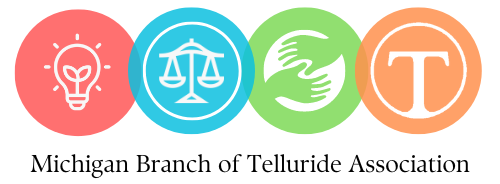The three pillars
Telluride House is founded on three philosophical ‘pillars’ that form the basis of House life. They are intellectual inquiry, community service, and self-governance.
Intellectual inquiry
Intellectual inquiry is the first pillar of Telluride House. While all three pillars are appreciated equally, housemembers have consistently prided themselves on being the leaders and best in academics at the University of Michigan. This spirit appears in House life as well, where the intellectual inquiry manifests itself in the form of:
-
Each housemember is responsible for planning and delivering a presentation to the house on any topic of interest. Every other week, the house gathers to listen to presentations, discuss, and debate the topics. To get an idea of past PubSpeak topics, check out this House Life page.
-
Faculty fellows give a lecture to the house on a topic in their field of expertise. This is a great opportunity for faculty fellows to share their research with students in a more intimate setting than a classroom, allowing for greater discussion and debate.
The faculty fellows program has been paused since the COVID pandemic.
-
Occasionally, Telluride House will invite guest lecturers to come in and speak with housemembers on a variety of issues. Previous events include an organized reflection on community service hosted by representatives from the University of Michigan's Ginsberg Center for Service Learning and an information session held by the University of Michigan's representative for a number of national and international scholarships such as the Goldwater, Truman, Churchill, Beinecke, Rhodes and Marshall, and Wallenberg Fellowship.
The guest lecturers program has been paused since the COVID pandemic.
Community Service
Community service is our second pillar. Through the yearly House projects, members of the Telluride House have created opportunities to make a difference in their community while also furthering the goals of the House and the Telluride Association. Projects change from year to year, but have in the past included things like tutoring local high schoolers, working with political refugees in Detroit, or meal preparation at an Ann Arbor teen center.
House community service projects allow the House to bond as we pursue a common goal; this pillar often gives us a moment to reflect that we are a kind of family with similarly good intentions at heart.
See our current service projects below:
-
Food Gatherers is an organisation that runs food rescue and food bank programs to alleviate hunger and eliminate its causes in Washtenaw county. The organisation partners with 170 agencies and programs, providing direct food assistance in the form of hot meals, nutritious snacks or emergency groceries to low-income adults, seniors and children. House members typically engage with the organisation through one of the following avenues 1) Sorting through rescued/donated food at the food gatherers warehouse 2) Delivering sorted food packages to local food bank partners or 3) Prepping/serving meals at the community kitchen at the Delonis Center in downtown Ann Arbor.
-
Peace Neighborhood Center (PNC) is an organization that provides programs for children and families affected by social and economic problems. MBTA has a joint program to address the gap in services for students enrolled at PNC. This projects provides the students with tutoring for the academic subjects that they are struggling with, assistance with writing college application essays and developing personal skills while providing mentorship in exploring future career pathways.
Democratic self-Governance
Self-governance is our third pillar at Telluride House. Our autonomy and practice of self-governance is a unique aspect of the House in comparison to other organizations at the University of Michigan. At Telluride House, self-governance means…
-
Housemembers meet biweekly to make almost all administrative and budgetary decisions about how the House is run.
-
Housemembers must hold elected positions and/or serve on committees:
Advisory Committee (AdComm): evaluates housemembers on terms of scholarship, provides conflict-resolution, and manages the relationship between Telluride House and Telluride Association
Event Planning Committee (EPComm): plans social events
Recruitment Committee (RComm): manages the housemember and faculty recruitment process
Project Development Committee (PDev): plans House service projects
Logistics Committee (LogComm): responsible for provision of supplies and security
There are a number of elected positions both relating to the committees and other.
-
Our community service projects are democratically developed and selected, meaning that all housemembers have the opportunity to submit a proposal for a House service project and vote on whether or not the Telluride House should sponsor and fund the project.
-
New housemembers and faculty fellows are selected by current housemembers through an extensive review process.


